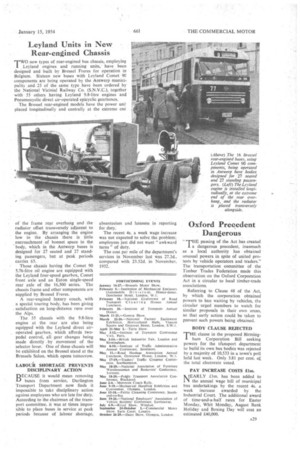Leyland Units in New Rear-engined Chassis
Page 31

If you've noticed an error in this article please click here to report it so we can fix it.
TWO new types of rear-engined bus chassis, employing Leyland engines and running units, have been designed and built by Brossel Freres for operation in Belgium. Sixteen new buses with Leyland Comet 90 components are being operated by the Antwerp municil pality and 25 of the same type have been ordered by the National Vicinial Railway Co. (S.NN.C.), together with 55 others having Leyland -9.8-litre engines and Pneumocyclic direct air-operated epicyclic gearboxes,
The Brossel rear-engined models have the power unii placed longitudinally and centrally at the extreme end
of the frame rear overhang and the radiator offset transversely. adjacent to the engine. By arranging the engine low in the chassis there is little encroachment of bonnet space in the body, which in the Antwerp buses is designed for 27 seated and 27 standing passengers, but at peak periods carries 65.
Those chassis having the Comet 90 5.76-litre oil engine are equipped with the Leyland four-speed gearbox, Comet front axle and an Eaton single-speed rear axle of the 16,500 series. The chassis frame and other components are supplied by Brossel Freres.
A rear-engined luxury coach, with a special touring body, has been giving satisfaction on long-distance runs over the Alps.
The 55 chassis with the 9.8-litre engine at the rear are also being equipped with the Leyland direct airoperated gearbox, which affords twopedal control, all gear changes being made directly ...by movement of the selector lever. One of these chassis will be exhibited on the Brossel stand at the Brussels Salon, which opens tomorrow,
LABOUR SHORTAGE PREVENTS DISCIPLINARY ACTION DEcAusE it would mean removing buses from service, Darlington Transport Department now -finds it impossible to take disciplinary action against employees who are late for duty. According to the chairman of the transport committee, it was at times impossible to place buses in service at peak periods because of labour shortage,
absenteeism and lateness in reporting for duty.
The recent 4s. a week wage increase was not expected to solve the problem; employees just did not want "awkward turns" of duty.
The cost per mile of the department's services in November last was 27.3d., compared with 23.52d, in November, 1952.




































































































